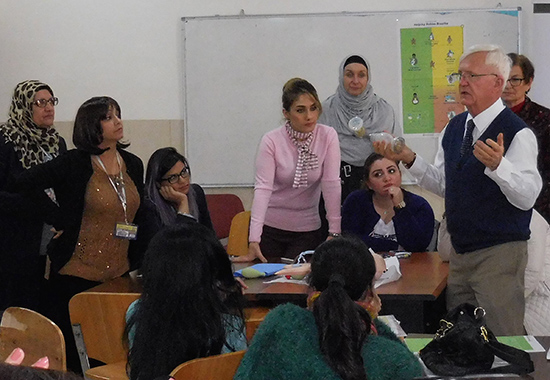By George and Marcia Bennett
June 2017
We have been volunteer specialists for the Neonatal Resuscitation Program – now the Maternal and Newborn Care Program - for LDS Charities since 2004. George is a retired anesthesiologist, so he has been helping people breathe all his professional life. Spending our retirement years teaching delivery attendants how to resuscitate babies in many different developing countries has been an exciting and wonderful extension of his life in medicine for both of us.
One of our most interesting and challenging experiences has been our projects in Iraq. In 2010, when the U.S. military was in Iraq our manager, Dean Walker, received a request from an Air Force pediatrician, LTC Vincent Barnhart, stationed in Anbar Province. Colonel Barnhart said that he could organize neonatal resuscitation training courses taught by U.S. Army certified NRP trainers and teach local Iraqi doctors, nurses and midwives, if LDS Charities could provide equipment and materials. Dean agreed and asked us to supervise the project – long distance. The manikins and bags and masks were shipped, and delivery attendants from ten large delivery facilities in Anbar Province were trained that first year. At the drawdown of the military, the training was continued for the next several years in Ramadi, Baghdad, Babil and Karbala in partnership with Amar Foundation and conducted by local Iraqi doctors who had originally been trained by the U.S. military.
In 2014, LDS Charities became heavily involved in humanitarian work in Kurdistan Region of Northern Iraq. We traveled personally to Erbil, the capital of Kurdistan, with the goal of developing a long term sustainable Helping Babies Breathe Program for the entire region. We found that because of the large refugee and internally displaced persons populations, and the dire economic conditions, the delivery facilities are both severely overcrowded and understaffed. Almost all babies are delivered in hospitals but mother and baby go home within two to three hours following a normal vaginal delivery. As a result, problems and challenges abound.
Our normal procedure is to work with a ministry of health, pediatric or neonatal society, local and international NGOs to partner and organize the trainings; our teams generally teach from two to five prospective trainers from each delivery facility, donate training equipment and materials to each facility, and request that they return to their facilities and train all other delivery room attendants and establish a basic ongoing training program in each hospital.
We had assurances and support of the program from the Ministry of Health and the Directorate of Health of Erbil Governorate, but due to the extreme situation in the delivery facilities in Kurdistan, our normal paradigm was obviously difficult to implement and sustain. We then met with the dean and teachers from the Nursing College of Hawler Medical University and found them enthusiastic to incorporate Helping Babies Breathe into their curriculum for nursing and midwifery students. In addition, their teachers work regularly with the nursing students in clinical settings. As a first step toward sustainability, this was a good approach for the implementation of Helping Babies Breathe.
During her participation in the first HBB trainings, Eva Said, a lecturer at the College of Nursing of Hawler Medical University and a PhD Candidate in Nursing from Kingston University in London, UK, introduced herself and asked about the possibility of HBB and the other HBS programs – ECEB and ECSB – and HMS BAB - as a nucleus for beginning a continuing medical education program for nursing and midwifery. Discussions ensued, involving the Department of Health for Erbil Governorate, the Kurdistan Regional Ministry of Health and officials of LDS Charities. As a result, the Erbil Nursing and Midwifery Development Programme has become a reality. The center, under Eva’s direction, has been given the authority to train all delivery attendants in all programs and to implement in all delivery facilities in Erbil Governorate. Each member of the center’s training team has qualified as a master trainer in all programs. Delivery room attendants are brought into the center for training and the team also goes directly to the facilities to train, re-train, mentor and monitor. A pilot project will begin very shortly to train healthcare workers and implement programs in two large refugee camps in Erbil Governorate.
Moving forward, the project this next year will be extended to Sulaymaniyah, where it will be likely implemented through the Sulaymaniyah Health Development & Training Center, whose members are eager to participate. Master trainers have also been trained in Duhok with the goal of implementing the HBS and HMS programs using the same paradigm.
The strong support of the Regional Ministry of Health, Hawler Medical University, the local directorates of health, and the professionals working in them have created the success of this multi-year effort. LDS Charities has provided training and clinical equipment to all participating facilities as well as all the written materials in English, Kurdish and Arabic.
There have been several major lessons learned in Iraq. The first lesson is, of course, that “the usual” does not always work. Developing a truly sustainable program takes a great champion, time, patience, adaptation to local customs, and some thinking outside the box. Despite the enormous challenges involved with working in a country with an active military conflict, we envision great progress ahead for the HBS and HMS programs in Kurdistan, Iraq.


Last Updated
11/15/2021
Source
American Academy of Pediatrics